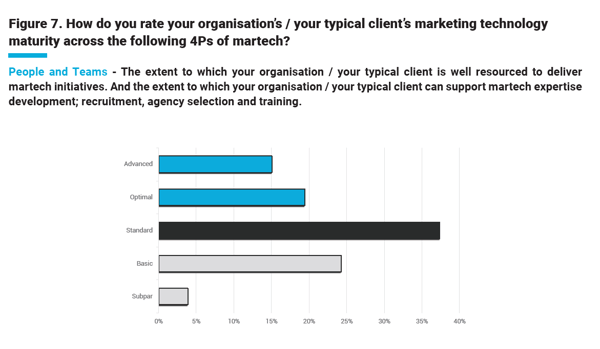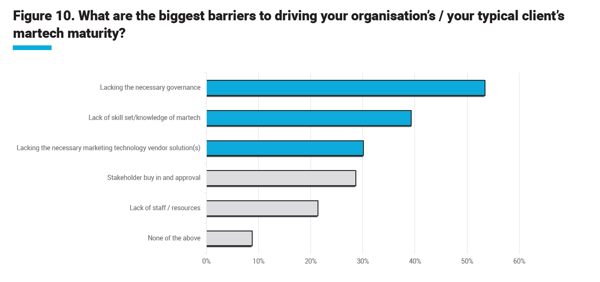If we think about martech maturity vs marketer tech skills maturity, you have to imagine it like this: one is wearing chinos in a wine bar, talking about taxes. The other is kicking the stuffing out of a lamppost outside the local Tesco's, and yelling about Roblox.

With more than 65% of respondents rating their company or clients as subpar to standard in terms of people and teams, and their ability to deliver martech initiatives, it’s clear there is a lack of people skilled in data, technology and analytics.
The thing is 78% recognise that "having a large digital skills talent pool as essential to driving UK competitiveness on the global stage". So the skills gap poses a serious problem to productivity and success.
And although 72% of respondents surveyed viewing marketing talent as more essential than technology, the gap persists.
According to Frans Riemersma, people with these skills can be hard to find:
Why? First, they combine marketing and technology skills. Second, they need to be business savvy, in the sense that they can structure processes, data, and technology to “follow the money”.
One solution to this challenge is to invest in the training needed to enable companies to make the most effective use of martech, and to ensure that budgets are invested in the right areas.
Great tech doesn’t take care of itself, though it’s not uncommon for organisations to make the assumption it does. CMOs can be guilty of making the necessary investment in great martech tools without fully appreciating the need to upskill, recruit the marketing talent or commission the specialist agency services to make best use of them”.- Carlos Doughty, CEO & Course instructor, MarTech Alliance
Check out The Martech Report 2021/2022, by Moore Kingston Smith and MarTech Alliance here for insights into skills gap, martech maturity, and more.
What is the current state of the skills gap?
- Only 28% of marketers viewing their in-house talent and tech as trained and working well
- 84% of marketers either already prioritise marketing technology or have more appetite to use marketing technology across the business as they enter 2021
- The more than 450 digital marketers surveyed indicate that there are a number of challenges currently standing in the way. For close to half (48%), a lack of skills to operate technology is a top-2 challenge
- A Wipro 2018 survey found that while 75% of marketing executives felt confident in their MarTech proficiency, a mere 6% believed that their own marketing teams are MarTech conversant.
- 69% of (surveyed) UK leaders believe they currently have a digital skills gap.
- UK organisations are currently experiencing the greatest skills gaps with paid social media advertising (71%), paid search advertising (70%), marketplace selling (71%) and SEO (66%).
- As companies look at what it will take to digitize their operations, many HR leaders see there is a significant skills gap. In fact, 64% of managers don't think their employees are able to keep pace with future skill needs. Furthermore, 70% of employees say they haven't even mastered the skills they need for their jobs today.
- 64% of respondents “rather disagreed” or “strongly disagreed” with the statement that they currently had enough personnel with the right skills to lead digital transformation of the firm.
- 84% of marketers either already prioritise marketing technology or have more appetite to use marketing technology across the business as they enter 2021.
Why is the skills gap persisting?
- A substantial 69% of marketers declared they expect to have fewer resources available to them in 2021, yet the belief is they will need to produce the same or better results
- The study found that martech related activities were among those they liked doing least: at least 78% of marketers did not identify learning and using marketing tools, developing campaign workflows, and managing prospect data as activities they enjoyed.
- Data is by far the fastest-growing category, up 25.5%. This makes sense as a ton of data is available. The challenge remains how best to harness it effectively.
- A recent survey by Rackspace found only 22% of CMOs have a clear understanding of the importance, use and benefits of technology to the business compared to their other C-Suite counterparts.
- According to a recent survey from Deloitte and RMIT Online out of 600 Australian businesses, 88% say it’s difficult to find skilled employees.
- A substantial 69% of marketers declared they expect to have fewer resources available to them in 2021, yet the belief is they will need to produce the same or better results.
What issues are marketers seeing with the skills gap?
- Despite the increasing martech spend in India, the report found that 64% of marketers see a lack of internal skills as a hurdle to martech growth.
- Over half of respondents (51%) “noted the lack of MarTech competency of the wider team was a barrier to success.”
- 74% believe that marketing organisations face a critical talent shortage due to a lack of digital skills that will be needed to meet ongoing customer demands.
- 44% of leaders fear their organisation's current lack of digital skills will have a 'fairly negative impact' on their success in the coming 12 months.
- 63% of employees don't think they "have the appropriate digital skills to fulfil new and emerging roles in their industry".
- Only 38% feel they "have the appropriate digital skills to benefit from the digital economy".
What skills are lacking?
- Only 30% of marketers believe their use of marketing technology completely aligns to their marketing strategy
- Monitoring data quality was found to form an important part of the “marketing technologist” role – but a minority of those surveyed by Altimeter feel confident in their data processes
- Fewer than 1 in 5 (18%) characterize their organization as deriving continuous and compounding value from data, with a similar share (20%) claiming that data strategy is becoming a core competency in some groups, but is not yet scaled across the organization.
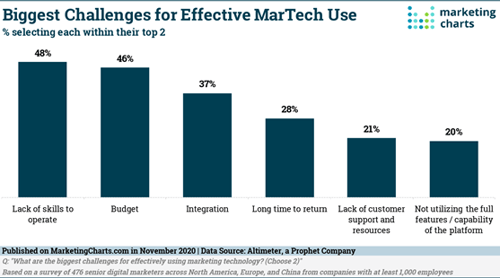
- You can see that the main skills that are most in demand are in the top right. These include:
- Communications strategy and planning
- Marketing finance
- Analysing customer data and insight
- Client/stakeholder management and presentation
- Data analysis and reporting
- Marketing automation
- Search marketing
- Mobile marketing
- The study also showed that although marketers are making large investments in CRM and other systems, almost 40% called themselves beginners or novices at integrating CRM with data
- Also, 90% struggle to align company sales and marketing data when executing campaigns across channels.
- In response to the question, “What skills and competencies will a future marketing workforce need to be successful in the next five years?”, nine of the top ten responses identify skills that are not typically associated with traditional marketing.
- These include technology skills (48%), openness to change (38%), adaptability (37%) and broader business knowledge (31%).
- 52% identify AI as the technology that will most influence the marketing function in the next five years — significantly higher than the next closest responses (mobile apps at 38%; voice/intelligent/digital assistants at 36%; and immersive technologies at 32%).
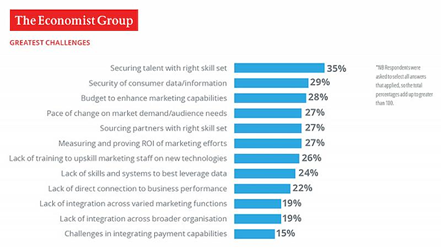
- Just 17% of enterprise marketers are 'well equipped to understand marketing automation or marketing cloud'
- It found 46% of surveyed marketing leaders indicated data & analytics as one of their top three skills gaps, closely followed by nearly four in 10 highlighting measuring performance and outcomes, which also relates to data. CX designed rounded out the top three.
Hey there, martech fans. Want to expand your knowledge on the space to the nth degree? Well, have we got a treat for you. Be the best martech-er you can be, and continue your learning journey, with our 4Ps ebook here!
Where are marketers investing?
- 80% of Indian marketers expect to raise their marketing technology (martech) spends over the next few years but a lack of expertise to operate the technology may hinder growth, according to The India Martech Report 2020.
- 72% of respondents view marketing talent as more essential than technology, yet 53% spend more money on tech
- 77% of marketers will be increasing investment in martech services over the next 12 months
- 59% of employees feel that "developing their digital skills will be important to their employability after COVID-19".
- Just 36% believe "their industry is placing enough investment in digital skills training and education".
- 80% believe "investment in digital skills capabilities will be important to the country’s economic recovery following COVID-19".
- 60% of marketing teams are investing little more than $500 on upskilling their teams and 1 in 5 are not investing at all.
- The Deloitte and RMIT Online survey also found that many (49%) are relying on attracting new employees to fill the skills gap, opting to do so over upskilling the workforce.
- 83% of respondents in the UK indicated that their organisation needs to invest more in staff training and development.
- Some 89% of respondents from the UK reported their digital marketing budgets increased over the last two years, with 39% of those reporting a significant increase, and 83% expecting their digital marketing budget to increase further by 2020.
- 53% spending more money on the tech than talent
- 18% of senior marketers are using an external partner or agency to upskill their employees.
- 77% of respondents said that they will be increasing their investment in martech services over the next 12 months
- 53% of senior marketers plan to bring in external martech support to plug gaps in their knowledge.
Where do Marketing Operations fit in?
One key role that is becoming more important, and even essential for the effective use and
management of martech projects, is that of marketing operations (or MOPs).
- While the majority of respondents are happy with the processes and governance underpinning their martech activities, rating themselves as optimal or advanced, it’s this same governance issue that is seen as the major barrier to advancing martech maturity for the majority
- With a shortage of skills and knowledge, we can see why marketing operations roles are becoming more and more important. It’s a role that can bridge the gap between IT and marketing, and encompasses technological knowledge and creativity.
How is the skills gap being resolved?
- Only 18% of senior marketers are using an external partner or agency to upskill their employees
- 77% of respondents stating that they will be increasing their investment in martech services over the next 12 months, and a further 53% of senior marketers are planning to bring in external martech support to plug gaps in their knowledge.
- To address this talent shortage, the research indicates that marketers will place a strong emphasis on recruitment (47% say they will focus “somewhat or much more” on recruitment), and a sizable number (40%) say they will focus on recruitment and re-skilling of their existing workforce equally.
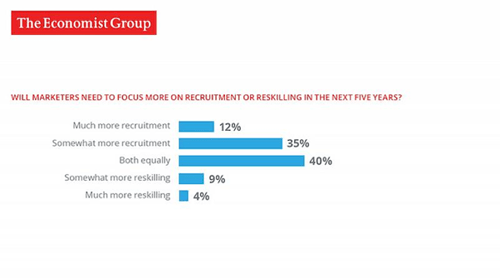
- 32% of C-level executives say that upskilling employees is a top priority in the next six months
Check out The Martech Report 2021/2022, by Moore Kingston Smith and MarTech Alliance here for insights into skills gap, martech maturity, and more.
This post is part of our Martech stats series, which compiles key data and trends. Others include:
- Martech Stats and Trends
- Customer Experience Stats and Trends.
- B2B Marketing Stats and Trends
- Account Based Marketing: Stats and Trends
- Social Video Marketing Stats and Trends
Hey there, martech fans. Want to expand your knowledge on the space to the nth degree? Well, have we got a treat for you. Be the best martech-er you can be, and continue your learning journey, with our 4Ps ebook here!

